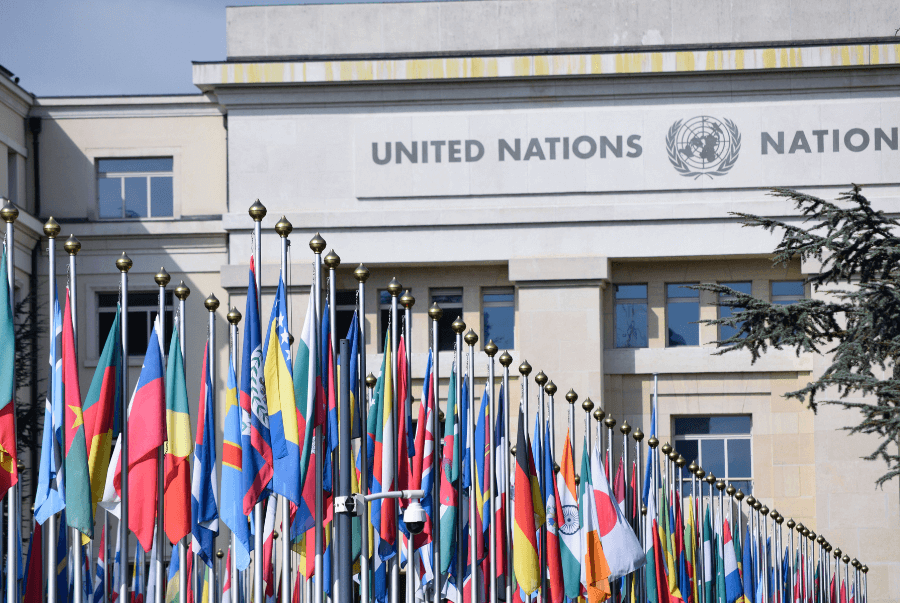
• 27 / 02 / 2019
Introduction
The UN stands out as a model of cooperation, diplomacy, and group problem-solving in the complicated world of international relations. The United States, a major participant in the complex dance of nations, is at the center of this international forum. This blog seeks to shed light on the important role the UN plays in influencing US foreign policy, encouraging collaboration, and tackling cross-border issues.
The Architects of Peace: Post-World War II Vision: The United Nations was founded in 1945, following World War II, with the principal objective of averting further international conflicts. This forms the basis of multilateralism. The organization's founders envisioned a forum for international communication, collaboration, and dispute settlement.
UN Charter Principles: The UN Charter enshrines fundamental principles, such as respecting human rights, resolving disputes peacefully, and working together to address global issues. The United States of America's commitment to multilateralism is based on these principles.
The United States in the UN:
1. Permanent Security Council Seat and Founding Member:
UN pillar: The fact that the US was one of the founding members of the UN highlights its dedication to diplomacy and collective security. The United States of America, one of the Security Council's five permanent members, is essential to preserving world peace and security.
Veto Power and Responsibilities: The United States has the ability to veto resolutions in the Security Council. With this power comes the obligation to navigate and contribute to international security.
Taking on Global Challenges:
1. UN Agencies and Programs for Humanitarian Initiatives: The US actively participates in UN initiatives and programs that deal with humanitarian problems. These partnerships, which range from UNICEF to the World Food Programme, strengthen US efforts to reduce suffering and advance world peace.
Global Health Initiatives: In order to combat pandemics and public health issues, organizations such as the World Health Organization (WHO) are essential allies. The United States works with these organizations to improve the infrastructure and response mechanisms for global health.
2. Peacekeeping and Conflict Resolution: Participating in Peacekeeping Operations: The United States takes part in UN peacekeeping operations, deploying troops and supplies to conflict-affected areas. America's commitment to upholding international peace and security is reflected in this involvement.
Diplomacy in Conflict Resolution: Through discussion and negotiation, the UN offers a diplomatic forum for resolving disputes. Recognizing the significance of cooperative solutions, the United States participates in these initiatives to alleviate regional and international tensions.
Respecting Human Rights:
1. Encouraging Human Dignity and Democracy: United Nations Human Rights Council The US actively participates in the UN Human Rights Council, promoting global human rights promotion and protection. This engagement is consistent with American values of democracy and individual liberty.
Initiatives Concerning Refugees and Migration: The United States supports and collaborates with the UNHCR, the organization that handles refugees, and programs related to migration. These cooperative initiatives tackle the multifaceted issues brought about by migration and displacement.
1. Environmental Stewardship: Paris Agreement on Climate Action and Sustainable Development Dedication: The United States participates in international efforts to combat climate change through the UN Framework Convention on Climate Change. One example of multilateral cooperation in tackling environmental challenges is the Paris Agreement.
The Sustainable Development Goals (SDGs) are a set of international goals that the United States follows in order to protect the environment, advance equality, and end poverty. Working together within the framework of the UN increases the effect of US efforts pertaining to sustainable development.
Handling International Disasters:
1. Pandemic Reaction and Readiness: United Nations Collaboration in Health Emergencies: Under the auspices of the UN, the World Health Organization is essential to the coordination of international responses to health emergencies. The United States participates in these initiatives to improve global pandemic preparedness and response.
2. Worldwide Issues, Collaborative Remedies: The United Nations offers a forum for coordinating reactions to international issues like cyberattacks, terrorism, and the spread of WMDs. The involvement of America increases the potency of these group reactions.
Conclusion
Through cooperation, communication, and shared responsibility, nations weave a diplomatic tapestry at the UN. Active participation in the UN is not just a diplomatic decision for the United States; it is a pledge to a world where problems are solved cooperatively, where peace is sought cooperatively, and where each person's dignity is respected. In order to achieve a more equitable, safe, and connected world, the United States' participation in the UN is still essential as it navigates the complex international scene. The United Nations is evidence of the idea that cooperation opens the door to a better, more peaceful future and that, in diplomacy as in life, unity breeds strength.
Sign up at UNIPREP, your one-stop platform for global opportunities in education, business, career & life abroad.
Cookies help us evaluate website traffic and improve user experience.Your information will be aggregated with the data of all other users after you agree to our usage of cookies.
UNIABROAD LTD.
Suite 524, Citibase, The Atrium, 1 Harefield Rd, Uxbridge UB8 1EX, United Kingdom
UNIABROAD Technology Ltd.
165/1,Opp Brahmasthana Kalyana Mantapa, Sahukar Chenniah Road, TK Layout, Mysuru, Karnataka
Privacy Policy | Terms & Conditions | Disclaimer | Refund Policy

Privacy Policy | Terms & Conditions | Disclaimer | Refund Policy
2023 © All rights reserved by UNIABROAD LTD.